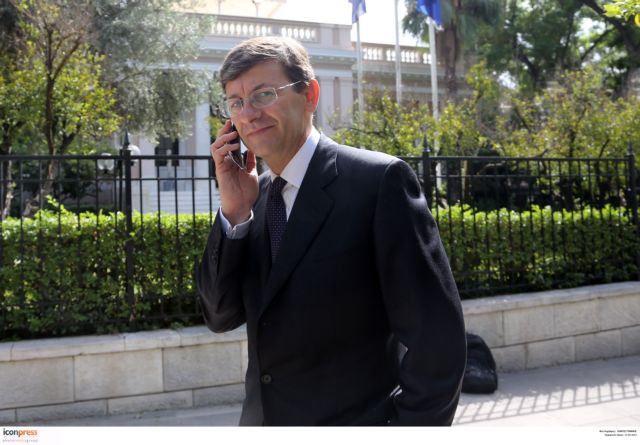Interview by Achilles Hekimoglou
The sale of Vodafone’s stake in Verizon, namely the third biggest deal in the history of mankind, was the right thing to do and a part of the price of this transaction will be invested in new generation networks in Europe. This is what the Vodafone Group CEO, Vittorio Colao stated in his interview in the newspaper «To Vima».
As he stated, he has asked Vodafone Greece to prepare a plan, in order to consider the possibilities of new investment in our country and he explained that Europe has lost ground in telecommunications. Vittorio Colao criticizes the new EU telecommunications proposals, since this cannot lead to bigger players and bigger investments, he stresses that financial crisis tunnel will be long and notes that only deep structural reforms can ensure that there will be a light at the end of this tunnel.
Finally, he urges the National Telecommunications Authority to do a quick care inspection on Cosmote’s dominant role in the market, but he does not foresee the possibility of a merger in the near future.
AH: Why did Vodafone agreed to sell its stake in Verizon Wireless?
VC: It has been a long and very successful story of two companies who have created a third company and this company has become bigger than the two parents and it has been a financial investment for many years with the things becoming so big that at some point somebody must own it; we looked on different solutions, different alternatives and like always in life there is a moment where there is a value in the table that makes sense. Great company, great future, great management, but it was a minority for us, it was not a Vodafone brand, it was not managed by us. Eventually it was the right thing to do.
AH:And it was a lot of money too.
VC: Yes. It was a lot of money back to our stakeholders, a lot of money to be invested in technology, to be invested in 4G and in new fast broadband networks in fixed and mobile, that Vodafone will have. It was a great opportunity to accelerate the strategy of our company, we call it project «Spring project».
AH:Will there be a «Spring project» here in Greece? Are you willing to divert financial resources from this transaction to Vodafone Greece?
VC: The «Spring project» is a Vodafone Group project. I have just had a meeting with Glafkos Persianis and the Management team of Vodafone Greece to discuss what they need to bring to the Greek customers the best possible experience that we can offer. I hope they will do a good job in convincing our people that a part of the «Spring project» money will come in Greece.
AH: Is Europe losing ground regarding LTE and the deployment of New Generation Networks? What can we do about it?
VC: Europe has lost ground due to two reasons. There is too much fragmentation of rules and markets. If you look at the US, Verizon has deployed 4G using frequencies that it owns forever. In Europe, every country sells frequencies at different time, different prices and with different life; and it is never forever. In a way, Europe is weakened by the fact that we have a lot of separate markets, as well as there is too much regulation, sometimes with good intentions and sometimes with less good intentions. But the reality is that in the US there are 4 operators, where in Europe there are a lot of rules and people continue to create new small operators.We need bigger players, stronger players with more capability to invest. And in Europe the policy has focused in small regulations, small interventions, both in local and European level and this has slowed down the industry.
AH: Do you agree with the core of Vice-President Kroes’ proposals?
VC: I agree with the objective of creating a more appealing European sector with true players with the good size. I am not convinced that they are doing the right things to make this happen in the best way. If you look at Vodafone, we have not bought into new European markets since a decade, while we have bought outside Europe. Why? Because there are less advantage in buying in Europe, than in buying outside of Europe. So, if I were Vice-President Kroes I would have asked myself «why, what have we done that stopped Vodafone to buy in Europe?». Let’s look at mobile termination rates. We lose 6-7% just because of that. Does it make sense? What’s the purpose? The purpose is to help smaller players. Isn’t the policy is to have bigger players? I believe that there are good intentions, but I am not sure that we create the conditions to have bigger players.
AH:Is there a light at the end of the tunnel of the European crisis?
VC: I see a light, but the tunnel is very long. Europe and in particular Southern Europe can have a recovery, but the recovery has to go through deeper structure of reforms in the labor market, in the public administration, in competition, in productivity. My strong encouragement to Greece, to Italy, to Spain –Portugal has done a good job –is to be courageous in introducing reforms, essentially having as objectives, to create employment for the youth, to increase productivity and to reduce the unit cost. Implementing these reforms, the tunnel might be long, but there will be a light at the end of it.
AH:And without them?
VC: Without structural reforms, Southern Europe will have a disadvantage versus the rest of Europe and the rest of the world. Greece now is giving a good example of stability. What is the alternative? The alternative could be instability, it could be depreciation and it could be losing real value for the families. I do not think that we need choose between unemployment and de facto poorer life.
AH:Vodafone Greece and Wind Hellas have announced co-investment for the development of their networks. What is the purpose of this co-operation?
VC: We are in front of an important period of investments in broadband and in new services. The Greek economy is small and clearly challenged. It is a way for us to put together our investment plans with a smaller competitor in order to save some money, which can be re-invested and create infrastructure quickly. Our intention is also to be efficient in creating jobs that will serve two companies and this will allow us to compete with Cosmote, who has a fairly dominant market share, around 50%. This co-operation is good for the country, good the customers, and good for the competition.
AH: Regarding the competition in the Greek market, should the local authorities regulate Cosmote?
VC: When one company controls the 51% of the mobile market, probably the 70% of the profit in mobile and the 85% of the cash flow, it is pretty strong. Therefore, the Regulator should ensure that there is a level playing field between the dominant player and the other players in the market. And therefore looking at things like for example the youth segment where they have 80% of the market and it is very hard to compete with them because they have «locked» their customer base completely. We filed against them and I will use this kind opportunity that you give me to urge a quick care inspection of that situation.
AH: Given the recent effort for a merger, will this co-operation with WIND Hellas lead to other projects as well?
VC: It is early and we do not know. Honestly, we have a great company, a great brand and a plan. We found the best solution to enable competition in the market. For the time being we are focused on delivering the joint-venture with Wind and the new network. For the time being there is no other plan.
AH:Will Vodafone participate in the next auction for spectrum in Greece?
VC: We do not announce our commercial plans ahead. Of course, spectrum is very important and if you look at our behavior, every time where we have found a good financial case, we have bought quality spectrum. My recommendation when I talk to the Governments is always to consider the benefit that comes to the country from having a very good quickly deployed fast broadband infrastructure versus to what they will get in cash. Both of them are very legitimate, they need balance them in an intelligent way.
– Originally published in Sunday print edition on 15/9/2013





